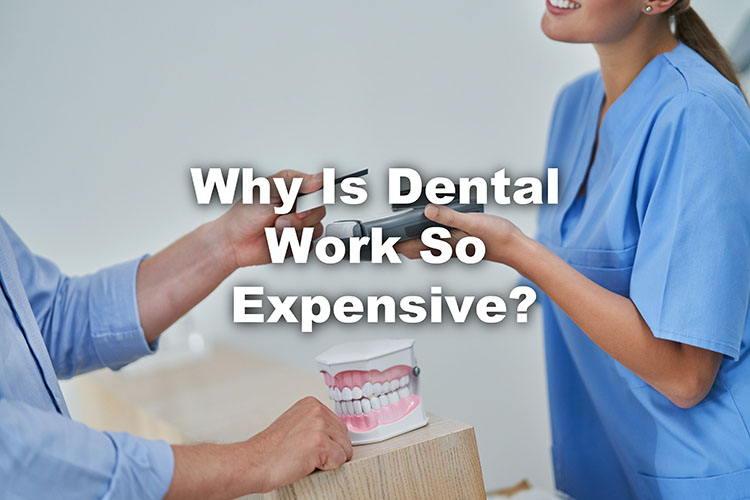When sitting in the dentist's chair, you've probably asked yourself, "why is dental work so expensive?" It can cost anywhere from $100 to thousands depending on your treatment. But beyond the fact that dentists are specialists and are worth it, other reasons exist for the exorbitant price. Use this guide to learn the reasons, average costs, and options to fund your dental payment.
Why Dental Work Costs So Much
Why Is Dental Work So Expensive?
The primary reason for the costly price of dental work is the clinic's overheads. A well-established dental office endures overhead costs of around 85% before the dentist makes money — and that was pre-Covid. The coronavirus pandemic was a complete game-changer for the industry, and many practices failed to survive the prolonged lockdowns.
So, those lucky enough to survive have more than likely raised their prices. Considering this list, it really comes as no surprise why dentists need to charge so much to stay afloat. They're a business, after all. Your dental payment, along with everybody else's, is expensive thanks to the ever-rising costs of running a practice, including:
- Staffing.
- Rent.
- Phone and internet.
- Electricity.
- Water.
- Specialist equipment.
- Supplies (including gloves, which are more expensive now thanks to Covid-19).
- Advertising.
- Labs.
- Merchant fees.
Average Dental Work Costs In Florida
When it comes to dental work in Florida, we are no exception to the costly prices. Getting dental treatment can come with a hefty price tag. So, how much will your dental payment be? Take a look at the state's average costs below. Just keep in mind they fluctuate depending on your county and clinic:
- Dental implants — $3,000 to $4,500.
- Dental veneers — $925 to $2,500 per tooth.
- Dental crown — $500 to $3,000.
- Tooth extraction — $219 to $4,000.
- Cleaning — $75 to $200.
- Scaling and root planning — $140 to $300 per quadrant.
- Silver amalgam dental fillings — $210 to $330 per tooth.
- Composite resin dental fillings — $150 to $450 per tooth.
- Teeth bonding — $90 to $1,000.
- Root canal — $300 to $2,000.
- Dentures — $600 to $3,000 for basic to mid-range, $4,000 to $8,000 for premium.
- Gum contouring — $50 to $350 per tooth.
- Gum tissue graft — $700 to $1,000.
- Full mouth periodontal surgery — $4,000 to $10,000.
- Dental sealant — $35 to $60 per tooth.
- Simple wisdom tooth removal — $75 to $200.
- Impacted wisdom tooth removal — $225 to $600 for one impacted wisdom tooth, $1,000 to $3,000 for all four.
- Teeth whitening — $300 to $1,000.
- Full mouth dental reconstruction — $30,000 to $150,000.

5 Ways To Fund Your Dental Payment
In a perfect world, you would have enough money saved in an emergency fund to cover serious dental work when necessary. But sadly, most of us don't live in an ideal world. Therefore, you might need financial help if you're hit with a catastrophic dental payment. Here are the top five ways to fund the costs:
1. Acquire Treatment From Dental Students
Firstly, you can think about where you're getting treatment. Heading to a typical dental practice means you'll be charged regular dental fees. However, allowing dentistry students to provide treatment lets you benefit from reduced costs. Even though the students haven't yet qualified, they are supervised by an experienced, licensed dentist, so your mouth is in safe hands.
2. Find Special Offers
When it comes to an expensive dental payment, finding special offers can really help out. Sometimes, dental offices run special promotions for new and existing patients. They give you extra savings on various treatments, helping reduce the overall costs. Before heading to the clinic, call them to see if they're running any promotions.
3. CareCredit
CareCredit is an option if you're experiencing financial hardship with your dental payments. The company allows you to fund advanced treatments by splitting the costs over several months. The payment plans bend to your budget, allowing you immediate relief should dental emergencies rear their ugly heads.
4. DentRite
Unlike CareCredit, DentRite helps you save money on the dental services you most often use. The plans provided by the company aren't insurance, but you don't need to file for benefits to gain acceptance either. To access the plan, you pay a small yearly fee, saving you a sometimes-large percentage of your routine oral care and emergency services.
5. Online Payday Loan
If none of the above options work for you, an online payday loan from Fast Payday Loans, Inc. is an option to help. This loan helps bridge the gap between pay periods when you really need money to help you out. We lend between $100 and $1,000 to fund dental expenses, and you don't even need a good credit score. Just follow the steps below to get started:
- Fill out the form on our website to get started.
- Speak with a loan associate from the nearest Florida online payday loan location on the phone. They'll tell you about the process and answer questions.
- Finish your application over the phone (no store visit is required!) or go to the closest store if you prefer.
- If you are approved, complete the paperwork and go over the loan terms. Once you are done, you can receive the money you need as soon as the same day.
Use This Guide To Fund Your Dental Payment!
Getting dental work can be a big pain point for most people. If you are struggling with your dental payment and are wondering why is dental work so expensive, definitely be sure to use the options in this guide. And if you really have an emergency, get an online payday loan in Florida to help you out. Fill out the online form now to get started.
Note: The content provided in this article is only for informational purposes, and you should contact your financial advisor about your specific financial situation.







